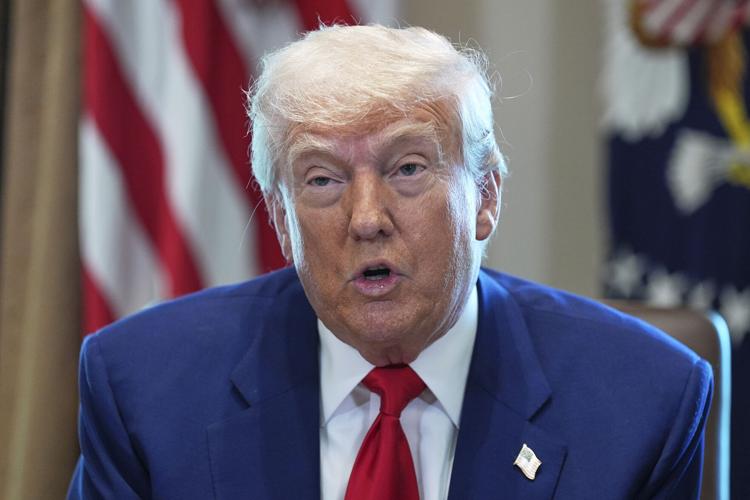WASHINGTON — President Donald Trump acknowledged Wednesday his tariffs could result in fewer and costlier products in the United States, saying American kids might "have two dolls instead of 30 dolls," but he insisted China will suffer more from his trade war.
The U.S. president tried to reassure a nervous country that his tariffs will not provoke a recession after a new government report showed that the U.S. economy shrank during the first three months of the year.
Trump was quick to blame his Democratic predecessor, Joe Biden, for setbacks while telling his Cabinet that his tariffs meant China was "having tremendous difficulty because their factories are not doing business," adding that the U.S. didn't really need imports from the world's dominant manufacturer.
"You know, somebody said, 'Oh, the shelves are going to be open,'" Trump continued, offering a hypothetical. "Well, maybe the children will have two dolls instead of 30 dolls. So maybe the two dolls will cost a couple bucks more than they would normally."
People are also reading…
His remarks followed a defensive morning after the Commerce Department reported that the U.S. economy shrank at an annual rate of 0.3% during the first quarter.
Behind the decline was a surge in imports as companies tried to front-run the sweeping tariffs on autos, steel, aluminum and almost every country. Even positive signs of increased domestic consumption indicated that purchases might be occurring before the import taxes lead to price increases.
Trump pointed his finger at Biden as the stock market fell Wednesday morning in response to the gross domestic product report.
"This is Biden's Stock Market, not Trump's," the Republican president, who took office in January, posted on his social media site. "Tariffs will soon start kicking in, and companies are starting to move into the USA in record numbers. Our Country will boom, but we have to get rid of the Biden 'Overhang.' This will take a while, has NOTHING TO DO WITH TARIFFS."
In January of 2024, months before the November presidential election, Trump tried to take credit for a healthier economy, posting on social media "THIS IS THE TRUMP STOCK MARKET BECAUSE MY POLLS AGAINST BIDEN ARE SO GOOD THAT INVESTORS ARE PROJECTING THAT I WILL WIN, AND THAT WILL DRIVE THE MARKET UP."
The GDP report gives Democrats ammunition to claim that Trump's policies could shove the economy into a recession. Democrats' statements after the GDP report noted how quickly the economy, which still has a healthy 4.2% unemployment rate, appears to have lost momentum within weeks of Trump returning to office.
Later in the day, Senate Republicans narrowly voted down a Democratic resolution, 49-49, that would have blocked global tariffs Trump announced in early April, giving the president a modest win.
The Democratic resolution forced a vote under a statute that allows them to try to terminate the national economic emergency Trump used to levy the tariffs. Democrats said their primary aim was to put Republicans on the record and to try to reassert congressional powers. Wary of a rebuke to Trump, GOP leaders encouraged their conference not to vote for the resolution.
The GDP report landed as Trump sought to put the focus on new corporate investments in the U.S. as he spends the week celebrating his 100th day in office.
Trump's economic message contains conflicting claims and dismisses data that raises red flags.
He wants credit for an aggressive first 100 days back in the White House that included mass layoffs of federal workers and the start of a trade war with 145% in new tariffs against China. He also wants to blame the negative response of the financial markets on Biden, who left office months ago.
He also claims his tariffs are negotiating tools to generate trade deals but at the same time is banking on hundreds of billions of dollars in tariff revenues to help cover his planned income tax cuts.
Trump highlighted the positive aspects of the GDP report at the Cabinet meeting. But that session revealed how his administration is also trying to take credit for policies that involve the Biden administration.
Commerce Secretary Howard Lutnick talked about his recent trip to Arizona to see the Taiwan Semiconductor Manufacturing Co.'s computer chip factories. The company notes on its website that it announced plans in May 2020, during Trump's first term when the coronavirus pandemic disrupted the global economy, to build its first plant in Arizona.
The company announced a second factory in December 2022, when Biden was in office. After getting up to $6.6 billion in commitments in 2024 from the bipartisan CHIPS and Science Act, TSMC announced plans for a third plant.
Trump dismissed the importance of the government support that Biden made possible for computer chip factories to open domestically.
"They're building because of the tariffs," Trump said.
Yet Democrats are quick to point out Trump inherited an economy on a steady course of low unemployment and declining inflation that his tariff plans have almost immediately disrupted.
"In just 100 days, President Trump has taken the U.S. economy from strong, stable growth to negative GDP," said Heather Boushey, a former member of Biden's White House Council of Economic Advisers. "This astonishing turn of fortune is directly due to the incoherence of his economic policy and his mismanagement of federal policy more generally."




















